| |
Date |
Event(s) |
| 1 | 1898 | |
| 2 | 1945 | |
| 3 | 1947 | - 1947—1947: Most severe winter in Britain for 53 years at start of the year - heavy snow and much
flooding later
- 1947—1947: First British nuclear reactor developed
- 1 Jan 1947—1 Jan 1947: Coal Mines nationalised
- 23 Feb 1947—23 Feb 1947: International Organization for Standardization (ISO) founded
- 1 Mar 1947—1 Mar 1947: International Monetary Fund begins financial operations
- 1 Apr 1947—1 Apr 1947: School leaving age raised to 15 in Britain
- 26 Oct 1947—26 Oct 1947: British military occupation ends in Iraq
- 20 Nov 1947—20 Nov 1947: Marriage of Princess Elizabeth (later Elizabeth II) and Philip Mountbatten in
Westminster Abbey
|
| 4 | 1948 | - 1948—1948: British Citizenship Act : all Commonwealth citizens qualify for British passports
- 1948—1948: Transistor radio invented
- 1948—1948: Long-playing record (LP) invented by Goldmark
- 1 Jan 1948—1 Jan 1948: British Railways nationalised
- 5 Jul 1948—5 Jul 1948: National Health Service (NHS) begins in Britain
- 29 Jul 1948—29 Jul 1948: London Olympics begin
|
| 5 | 1949 | - 1949—1949: Maiden flight of the Bristol Brabazon (broken up in 1953 for scrap)
- 1949—1949: De Haviland produces the Comet - first jet airliner
- 15 Mar 1949—15 Mar 1949: Clothes rationing ends in Britain
- 4 Apr 1949—4 Apr 1949: Twelve nations sign The North Atlantic Treaty creating NATO
|
| 6 | 1950 | - 19 May 1950—19 May 1950: Points rationing ends in Britain
- 26 May 1950—26 May 1950: Petrol rationing ends in Britain
- 25 Jun 1950—27 Jul 1953:
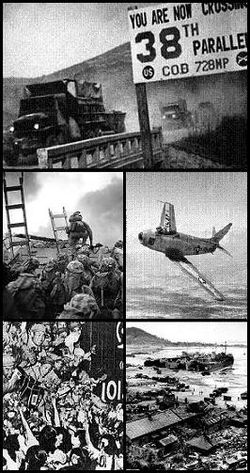 Korean War Korean War
- 11 Jul 1950—11 Jul 1950: 'Andy Pandy' first seen on BBC TV
- 9 Sep 1950—9 Sep 1950: Soap rationing ends in Britain
- 28 Dec 1950—28 Dec 1950: The Peak District becomes the Britain's first National Park
|
| 7 | 1951 | - 3 May 1951—3 May 1951: Festival of Britain and Royal Festival Hall open on South Bank, London
- 28 May 1951—28 May 1951: First Goon Show broadcast
- 20 Dec 1951—20 Dec 1951: Electricity first produced by nuclear power, from Experimental Breeder Reactor
|
| 8 | 1952 | - 1952—1952: Contraceptive pill invented
- 1952—1952: Britain explodes her first atomic bomb, in Australia
- 1952—1952: Radioactive carbon used for dating prehistoric objects
- 1952—1952: Bonn Convention: Britain, France and USA end their occupation of West Germany
- 6 Feb 1952—6 Feb 1952: King George VI dies
- 21 Feb 1952—21 Feb 1952: Identity Cards abolished in Britain
- 2 May 1952—2 May 1952: First commercial jet airliner service launched, by BOACComet between London
and Johannesburg
- 5 Jul 1952—5 Jul 1952: Last tram runs in London (Woolwich to New Cross)
- 16 Aug 1952—16 Aug 1952: Lynmouth (North Devon) flood disaster
- 6 Sep 1952—6 Sep 1952: DH110 crashes at Farnborough Air Show, 26 killed
- 3 Oct 1952—3 Oct 1952: End of tea rationing in Britain
- 1 Nov 1952—1 Nov 1952: The first H-bomb ever ('Mike') was exploded by the USA - the mushroom cloud
was 8 miles across and 27 miles high. The canopy was 100 miles wide. Radioactive mud fell
out of the sky followed by heavy rain. 80 million tons of earth was vaporised.
- 25 Nov 1952—25 Nov 1952: Agatha Christie's 'The Mousetrap' opens in London
- 4 Dec 1952—4 Dec 1952: Great smog hits London
|
| 9 | 1953 | - 20 Jan 1953—20 Jan 1961:
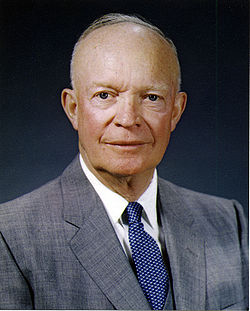 Dwight D. Eisenhower U.S. Presidency Dwight D. Eisenhower U.S. Presidency
- 31 Jan 1953—31 Jan 1953: Said to be the biggest civil catastrophe in Britain in the 20th century -
severe storm and high tides caused the loss of hundreds of lives - - effects travelled from the
west coast of Scotland round to the south-east coast of England [The Netherlands were even
worse affected with over a thousand deaths]
- 5 Feb 1953—5 Feb 1953: Sweet rationing ends in Britain
- 5 Mar 1953—5 Mar 1953: Death of Stalin
- 26 Mar 1953—26 Mar 1953: Jonas Salk announces his polio vaccine
- 24 Apr 1953—24 Apr 1953: Winston Churchill knighted
- 25 Apr 1953—25 Apr 1953: Francis Crick and James D Watson publish the double helix structure of DNA
- 2 Jun 1953—2 Jun 1953: Coronation of Elizabeth II
- 26 Sep 1953—26 Sep 1953: Sugar rationing ends in Britain (after nearly 14 years)
|
| 10 | 1954 | - 1954—1954: First comprehensive school opens in London
- 1954—1954: Routemaster bus starts operating in London
- 1954—1954: First transistor radios sold
- 6 May 1954—6 May 1954: First sub 4 minute mile (Roger Bannister, 3 mins 59.4 secs)
- 3 Jul 1954—3 Jul 1954: Food rationing officially ends in Britain
- 5 Jul 1954—5 Jul 1954: BBC broadcasts its first television news bulletin
- 30 Sep 1954—30 Sep 1954: First atomic powered sumbmarine USS Nautilus commissioned
|
| 11 | 1955 | - 1955—1955: 'Mole' self-grip wrench patented by Thomas Coughtrie of Mole & Sons
- 27 Jul 1955—27 Jul 1955: Jul 27: Allied occupation of Austria (after WW2) ends
- 22 Sep 1955—22 Sep 1955: Commercial TV starts in Britain
|
| 12 | 1956 | - 1956—1956: Britain constructs world's first large-scale nuclear power station in Cumberland
- 1 Mar 1956—1 Mar 1956: Radiotelephony spelling alphabet introduced (Alpha, Bravo, etc)
- 17 Apr 1956—17 Apr 1956: Premium Bonds first launched - first prizes drawn on 1 Jun 1957
- 3 Jun 1956—3 Jun 1956: 3rd class travel abolished on British Railways (renamed 'Third Class' as 'Second
Class', which had been abolished in 1875 leaving just First and Third Class)
- 31 Oct 1956—31 Oct 1956: Britain and France invade Suez
|
| 13 | 1957 | - 1957—1957: Britain introduces parking meters
- 1957—1957: Helvetica typeface developed (in Switzerland)
- 11 Jan 1957—11 Jan 1957: Harold Macmillan becomes Prime Minister
- 14 May 1957—14 May 1957: Post-Suez petrol rationing ends
- 15 May 1957—15 May 1957: Britain explodes her first hydrogen bomb, at Christmas Island
- 25 May 1957—25 May 1957: Treaty of Rome to create European Economic Community (EEC) of six
countries: France, West Germany, Italy, Belgium, Holland and Luxembourg - became
operational Jan 1958
- 4 Dec 1957—4 Dec 1957: Lewisham rail disaster - 90 killed as two trains collide in thick fog and a viaduct
collapses on top of them
- 25 Dec 1957—25 Dec 1957: Queen's first Christmas TV broadcast
|
| 14 | 1958 | - 1958—1958: Easter: First anti-nuclear protest march to Aldermaston (emergence of CND)
- 1958—1958: Computers begin to be used in research, industry and commerce
- 1958—1958: USA begins to produce Inter-Continental Ballistic Missiles (ICBMs)
- 13 May 1958—13 May 1958: Velcro trade mark registered
- 26 Jul 1958—26 Jul 1958: Prince Charles' Investiture as 'Prince of Wales'
- 5 Dec 1958—5 Dec 1958: Inauguration of Subscriber Trunk Dialling (STD) in Britain (completed in 1979)
- 5 Dec 1958—5 Dec 1958: Preston by-pass opens - UK's first stretch of motorway
|
| 15 | 1959 | - 3 Feb 1959—3 Feb 1959: 'The Day The Music Died' - plane crash kills Buddy Holly, Ritchie Valens, and
The Big Bopper
- 17 Feb 1959—17 Feb 1959: Vanguard 2 satellite launched - first to measure cloud-cover distribution
- 24 May 1959—24 May 1959: Empire Day becomes Commonwealth Day
- Aug 1959—Aug 1959: BMC Mini car launched
- 26 Sep 1959—30 Apr 1975:
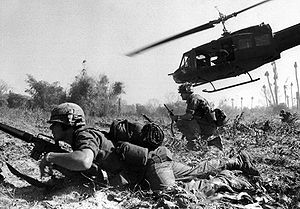 Vietnam War Vietnam War
- 3 Oct 1959—3 Oct 1959: Postcodes introduced in Britain
- 1 Nov 1959—1 Nov 1959: First section of M1 motorway opened
|
| 16 | 1960 | - 17 Mar 1960—17 Mar 1960: New ?1 notes issued by Bank of England
- 18 Mar 1960—18 Mar 1960: Last steam locomotive of British Railways named
- 21 Jul 1960—21 Jul 1960: Francis Chichester arrives in New York aboard Gypsy Moth II (took 40 days),
winning the first single-handed transatlantic yacht race which he co-founded
- 12 Aug 1960—12 Aug 1960: Echo I, the first (passive) communications satellite, launched
- 12 Sep 1960—12 Sep 1960: MoT tests on motor vehicles introduced
- 1 Oct 1960—1 Oct 1960: HMS 'Dreadnought' nuclear submarine launched
- 2 Nov 1960—2 Nov 1960: Penguin Books found not guilty of obscenity in the 'Lady Chatterley's Lover' case
|
| 17 | 1961 | - 1 Jan 1961—1 Jan 1961: Farthing ceases to be legal tender in UK
- 20 Jan 1961—22 Nov 1963:
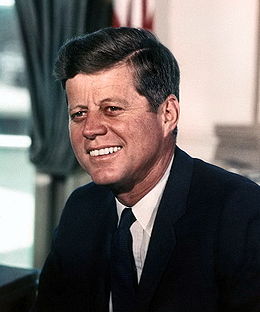 John F. Kennedy U.S. Presidency John F. Kennedy U.S. Presidency
- 13 Mar 1961—13 Mar 1961: Black & White ?5 notes cease to be legal tender
- 14 Mar 1961—14 Mar 1961: New English Bible (New Testament) published
- 1 May 1961—1 May 1961: Betting shops legal in Britain
|
| 18 | 1962 | - 1962—1962: Britain passes Commonwealth Immigrants Act to control immigration
- 1962—1962: Thalidomide withdrawn after it causes deformities in babies
- 1962—1962: Britain and France agree to construct 'Concorde'
- 25 May 1962—25 May 1962: Consecration of new Coventry Cathedral (old destroyed in WW2 blitz)
- 15 Jun 1962—15 Jun 1962: First nuclear generated electricity to supplied National Grid (from Berkeley Glos)
- Jul 1962—Jul 1962: First passenger-carrying hovercraft enters service, along the North Wales Coast from Moreton to Rhyl
- 10 Jul 1962—10 Jul 1962: First TV transmission between US and Europe (Telstar) - first live broadcast on 23 Jul
- 24 Oct 1962—24 Oct 1962: Cuba missile crisis - brink of nuclear war
|
| 19 | 1963 | - 1963—1963: France vetoes Britain's entry into EEC
- Jan 1963—Jan 1963: Cold weather forces cancellation of most football matches (only 4 English First Division matches in the month) - the first 'pools panel' created
- 27 Mar 1963—27 Mar 1963: Beeching Report on British Railways (the 'Beeching Axe')
- 1 Aug 1963—1 Aug 1963: Minimum prison age raised to 17
- 8 Aug 1963—8 Aug 1963: 'Great Train Robbery' on Glasgow to London mail train
- 17 Sep 1963—17 Sep 1963: Fylingdales (Yorks) early warning system operational
- 18 Nov 1963—18 Nov 1963: Dartford Tunnel opens
- 22 Nov 1963—20 Jan 1969:
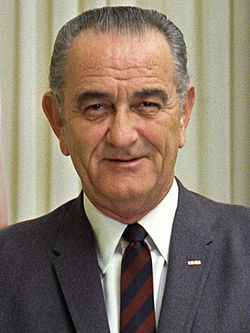 Lyndon B. Johnson U.S. Presidency Lyndon B. Johnson U.S. Presidency
- 23 Nov 1963—23 Nov 1963: First episode of 'Dr Who' on BBC TV
|
| 20 | 1964 | - 1 Jan 1964—1 Jan 1964: First 'Top of the Pops' on BBC TV
- 9 Apr 1964—9 Apr 1964: First Greater London Council (GLC) election
- 21 Apr 1964—21 Apr 1964: BBC2 TV launched
- 22 Aug 1964—22 Aug 1964: 'Match of the Day' starts on BBC2
- 4 Sep 1964—4 Sep 1964: Forth road bridge opens
|
| 21 | 1965 | - 1965—1965: Britain enacts first Race Relations Act
- 7 Feb 1965—7 Feb 1965: First US raids against North Vietnam
- 7 Apr 1965—7 Apr 1965: Winston Churchill dies
- 1 Aug 1965—1 Aug 1965: TV cigarette advertising banned in Britain
- 8 Oct 1965—8 Oct 1965: Post Office Tower operational in London
- 28 Oct 1965—28 Oct 1965: Death penalty for murder suspended in Britain for five-year trial period, then
abolished 18 Dec 1969
- 22 Dec 1965—22 Dec 1965: 70mph speed limit introduced on British roads
|
| 22 | 1966 | - 14 Feb 1966—14 Feb 1966: Australia converts from ? to $
- 3 May 1966—3 May 1966: 'The Times' begins to print news on its front page in place of classified
Advertisements
- 30 Jul 1966—30 Jul 1966: World Cup won by England at Wembley (4-2 in extra time v West Germany)
- 8 Sep 1966—8 Sep 1966: First Severn road bridge opens
- 21 Oct 1966—21 Oct 1966: Aberfan disaster - slag heap slip kills 144, incl. 116 children
- 1 Dec 1966—1 Dec 1966: First Christmas stamps issued in Britain
|
| 23 | 1967 | - 4 Jan 1967—4 Jan 1967: Donald Campbell dies attempting to break his world water speed record on
Conniston Water - his body and Bluebird recovered in 2002
- 18 Mar 1967—18 Mar 1967: 'Torrey Canyon' oil tanker runs aground off Lands End first major oil spill
- 28 May 1967—28 May 1967: Francis Chichester arrives in Plymouth after solo circumnavigation in Gipsy Moth IV (he was knighted 7th July at Greenwich by the queen using the sword with which Elizabeth I had knighted Sir Francis Drake four centuries earlier
- 27 Jun 1967—27 Jun 1967: First withdrawal from a cash dispenser (ATM) in Britain - at Enfield branch of Barclays
- 1 Jul 1967—1 Jul 1967: First colour TV in Britain
- 14 Aug 1967—14 Aug 1967: Offshore pirate radio stations declared illegal by the UK
- 20 Sep 1967—20 Sep 1967: 'QE2' launched on Clydebank
- 27 Sep 1967—27 Sep 1967: 'Queen Mary' arrives Southampton at end of her last transatlantic voyage
- 30 Sep 1967—30 Sep 1967: BBC Radios 1 2 3 & 4 open first record played on Radio 1 was the controversial 'Flowers in the Rain' by 'The Move'
- 5 Oct 1967—5 Oct 1967: Introduction of majority verdicts in English courts
|
| 24 | 1968 | - 18 Feb 1968—18 Feb 1968: British Standard Time introduced - Summer Time became permanent but arguments prevailed and Britain reverted to GMT in October 1971
- 18 Apr 1968—18 Apr 1968: London Bridge sold (and eventually moved to Arizona) - modern London Bridge, built around it as it was demolished, was opened in Mar 1973
- 20 Apr 1968—20 Apr 1968: Enoch Powell 'Rivers of Blood' speech on immigration
- 23 Apr 1968—23 Apr 1968: Issue of 5p and 10p decimal coins in Britain
- 29 May 1968—29 May 1968: Manchester United first English club to win the European Cup
- 11 Aug 1968—11 Aug 1968: Last steam passenger train service ran in Britain (Carlisle- Liverpool)
- 16 Sep 1968—16 Sep 1968: Two-tier postal rate starts in Britain
- 5 Oct 1968—5 Oct 1968: Beginning of disturbances in N Ireland
|
| 25 | 1969 | - 20 Jan 1969—9 Aug 1974:
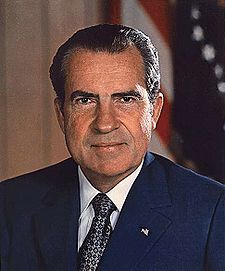 Richard Nixon U.S. Presidency Richard Nixon U.S. Presidency
- 2 Mar 1969—2 Mar 1969: Maiden flight of 'Concorde', at Toulouse
- 7 Mar 1969—7 Mar 1969: Victoria Line tube opens in London
- 17 Apr 1969—17 Apr 1969: Voting age lowered from 21 to 18
- 2 May 1969—2 May 1969: Maiden voyage of liner Queen Elizabeth 2 (QE2)
- 20 Jul 1969:
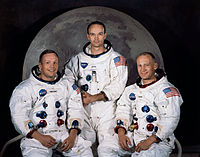 Apollo 11 Moon Landing Apollo 11 Moon Landing
- 31 Jul 1969—31 Jul 1969: Halfpenny ceases to be legal tender in Britain
- 14 Aug 1969—14 Aug 1969: Civil disturbances in Ulster - Britain sends troops to support civil authorities
- 7 Sep 1969—7 Sep 1969: First episode of 'Monty Python's Flying Circus' recorded
- 14 Oct 1969—14 Oct 1969: 50p coin introduced in Britain (reduced in size 1998)
|
| 26 | 1970 | - 1970—1970: Boeing 747 (Jumbo jet) goes into service
- 17 Jun 1970—17 Jun 1970: Decimal postage stamps first issued for sale in Britain
- 19 Jun 1970—19 Jun 1970: Edward Heath becomes Prime Minister
- 30 Jul 1970—30 Jul 1970: Damages awarded to Thalidomide victims
- 19 Sep 1970—19 Sep 1970: First Glastonbury Festival held
- 20 Nov 1970—20 Nov 1970: Ten shilling note (50p after decimalisation) goes out of circulation in Britain
|
| 27 | 1971 | - 1971—1971: Banking and Financial Dealings Act - replaced the Bank Holidays Act of 1871
- 1971—1971: Sunday becomes the seventh day in the week as UK adopts decision of the International
Standardisation Organisation (ISO) to call Monday the first day
- 1971—1971: 'Greenpeace' founded
- 1971—1971: Rolls-Royce declared bankrupt
- 3 Jan 1971—3 Jan 1971: Open University starts
- 15 Feb 1971—15 Feb 1971: Decimalisation of coinage in UK and Republic of Ireland
- 9 Aug 1971—9 Aug 1971: Internment without trial introduced in N Ireland
- 28 Oct 1971—28 Oct 1971: Parliament votes to join Common Market (joined 1973)
- 28 Oct 1971—28 Oct 1971: UK launches its first (and only) satellite, Prospero
|
| 28 | 1972 | - 1972—1972: Britain imposes direct rule in Northern Ireland
- 1972—1972: Strict anti-hijack measures introduced internationally, especially at airports
- 1972—1972: Dutch Elm disease devastates trees across UK
- 1972—1972: Domestic video cassette recorders introduced
- 30 Jan 1972—30 Jan 1972: 'Bloody Sunday' in Derry, Northern Ireland
- 28 May 1972—28 May 1972: Duke of Windsor (ex-King Edward VIII) dies in Paris
|
| 29 | 1973 | - 1 Jan 1973—1 Jan 1973: Britain enters EEC Common Market (with Ireland and Denmark)
- 17 Mar 1973—17 Mar 1973: Modern London Bridge opened by the Queen
- 1 Apr 1973—1 Apr 1973: VAT introduced in Britain
- 26 Sep 1973—26 Sep 1973: Concorde makes its first non-stop crossing of the Atlantic in record-breaking
time
- 14 Oct 1973—14 Oct 1973: Marriage of Princess Anne and Captain Mark Phillips in Westminster Abbey
- 31 Dec 1973—31 Dec 1973: Miners strike and oil crisis precipitate 'three-day week' (till 9 Mar 1974) to
conserve power
|
| 30 | 1974 | - 1974—1974: New counties formed in Britain after re-organisation of some county boundaries
- 1 Jun 1974—1 Jun 1974: Flixborough disaster: explosion at chemical plant kills 28 people
- 9 Aug 1974—20 Jan 1977:
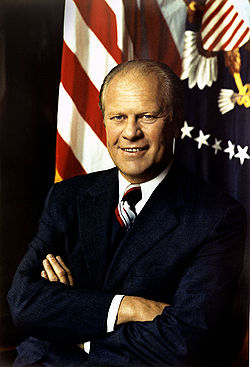 Gerald Ford U.S. Presidency Gerald Ford U.S. Presidency
- 7 Nov 1974—7 Nov 1974: Lord Lucan disappears
- 21 Nov 1974—21 Nov 1974: Birmingham pub bombings by the IRA
|
| 31 | 1975 | - 1975—1975: Unemployment in Britain rises above 1M for first time since before WW2
- 11 Feb 1975—11 Feb 1975: Margaret Thatcher becomes leader of Conservative party (in opposition)
- 28 Feb 1975—28 Feb 1975: Moorgate tube crash in London - over 43 deaths, greatest loss of life on the
Underground in peacetime. The cause of the incident was never conclusively determined
- 4 Mar 1975—4 Mar 1975: Charlie Chaplin knighted
- 5 Jun 1975—5 Jun 1975: UK votes in a referendum to stay in the European Community
- 29 Oct 1975—29 Oct 1975: 'Yorkshire Ripper' commits his first murder
- 3 Nov 1975—3 Nov 1975: First North Sea oil comes ashore
- 29 Nov 1975—29 Nov 1975: The name 'Micro-soft' coined by Bill Gates (Microsoft' became a Trademark the
following year)
- 27 Dec 1975—27 Dec 1975: Equal Pay Act and Sex Discrimination Act come into force
|
| 32 | 1976 | - 1976—1976: 'Cod War' between Britain and Iceland
- 1976—1976: Deaths exceeded live births in E&W for first time since records began in 1837
- 1976—1976: James Callaghan becomes Prime Minister
- 1976—1976: National Theatre opens in London
- 21 Jan 1976—21 Jan 1976: Concorde enters supersonic passenger service
- 1 Apr 1976—1 Apr 1976: Apple Computer formed by Steve Jobs and Steve Wozniak
- 6 Aug 1976—6 Aug 1976: Drought Act 1976 comes into force ? the long, hot summer
|
| 33 | 1977 | - 20 Jan 1977—20 Jan 1981:
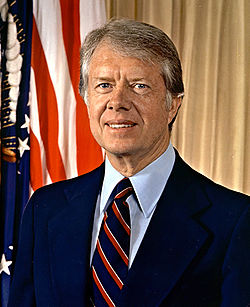 Jimmy Carter U.S. Presidency Jimmy Carter U.S. Presidency
- 2 Mar 1977—2 Mar 1977: 'Red Rum' wins a third Grand National
- 25 May 1977—25 May 1977: George Lucas' film Star Wars' released
- 5 Jun 1977—5 Jun 1977: Apple II, the first practical personal computer, goes on sale
- 7 Jun 1977—7 Jun 1977: Queen's Silver Jubilee celebrations in London
- 22 Nov 1977—22 Nov 1977: Regular supersonic Concorde service between London and NY inaugurated
|
| 34 | 1978 | - 8 Apr 1978—8 Apr 1978: Regular broadcast of proceedings in Parliament starts
- 1 May 1978—1 May 1978: First May Day holiday in Britain
- 25 Jul 1978—25 Jul 1978: World's first 'test tube' baby, Louise Browne born in Oldham
- 30 Nov 1978—30 Nov 1978: Publication of The Times suspended - industrial relations problems (until 13
Nov 1979)
|
| 35 | 1979 | - 1 Mar 1979—1 Mar 1979: 32.5% of Scots vote in favor of devolution (40% needed) - Welsh vote overwhelmingly against
- 30 Mar 1979—30 Mar 1979: Airey Neave killed by a car bomb at Westminster
- 31 Mar 1979—31 Mar 1979: Withdrawal of the Royal Navy from Malta
- 4 May 1979—4 May 1979: Margaret Thatcher becomes first woman UK Prime Minister
- 1 Jul 1979—1 Jul 1979: Sony introduces the Walkman
- 27 Aug 1979—27 Aug 1979: Lord Mountbatten and 3 others killed in bomb blast off coast of Sligo, Ireland
- 18 Sep 1979—18 Sep 1979: ILEA votes to abolish corporal punishment in its schools
|
| 36 | 1980 | - 5 May 1980—5 May 1980: SAS storm Iranian Embassy in London to free hostages
- 8 Dec 1980—8 Dec 1980: John Lennon assassinated in New York
|
| 37 | 1981 | - 20 Jan 1981—20 Jan 1989:
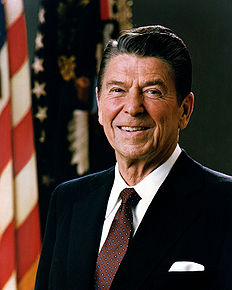 Ronald Reagan U.S. Presidency Ronald Reagan U.S. Presidency
- 25 Jan 1981—25 Jan 1981: Launch of SDP by 'Gang of Four' in Britain
- 29 Mar 1981—29 Mar 1981: First London marathon run
- 11 Apr 1981—11 Apr 1981: Brixton riots in South London - 30 other British cities also experience riots
- 25 Apr 1981—25 Apr 1981: Worst April blizzards this century in Britain
- 27 Apr 1981—27 Apr 1981: First use of computer mouse (by Xerox PARC system)
- 29 Jul 1981—29 Jul 1981: Wedding of Prince Charles and Lady Diana Spencer (divorced 28 Aug 1996)
- 12 Aug 1981—12 Aug 1981: IBM launches the first PC
- 12 Aug 1981—12 Aug 1981: IBM launches its PC ? starts the general use of personal computers
- 12 Aug 1981:
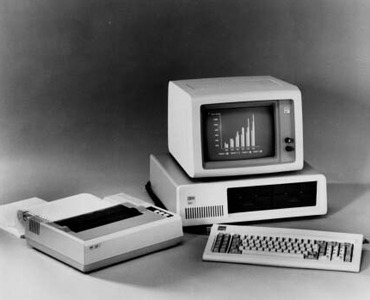 Personal Computer Personal Computer
|
| 38 | 1982 | - 26 Jan 1982—26 Jan 1982: Unemployment reached 3 million in Britain (1 in 8 of working population)
- 5 Feb 1982—5 Feb 1982: Laker Airways collapses
- 19 Feb 1982—19 Feb 1982: DeLorean Car factory in Belfast goes into receivership
- 18 Mar 1982—18 Mar 1982: Argentinians raised flag in South Georgia
- 2 Apr 1982—2 Apr 1982: Argentina invades Falkland (Malvinas) Islands
- 5 Apr 1982—5 Apr 1982: Royal Navy fleet sails from Portsmouth for Falklands
- 2 May 1982—2 May 1982: British nuclear submarine HMS Conqueror sinks Argentine cruiser General
Belgrano
- 28 May 1982—28 May 1982: First land battle in Falklands (Goose Green)
- 14 Jun 1982—14 Jun 1982: Ceasefire in Falklands
- 21 Jun 1982—21 Jun 1982: Prince William is born
- 20 Jul 1982—20 Jul 1982: IRA bombings in London (Hyde Park and Regents Park)
- 19 Sep 1982—19 Sep 1982: Smiley emoticon :-) said to have been used for the first time
- 1 Oct 1982:
 Compact_Disc Compact_Disc
- 11 Oct 1982—11 Oct 1982: Mary Rose' raised in the Solent (sank in 1545)
- 31 Oct 1982—31 Oct 1982: Thames Barrier raised for first time (some say first public demonstration Nov 7)
- 2 Nov 1982—2 Nov 1982: Channel 4 TV station launched - first programme 'Countdown'
- 4 Nov 1982—4 Nov 1982: Lorries up to 38 tonnes allowed on Britain's roads
- 12 Dec 1982—12 Dec 1982: Women's peace protest at Greenham Common (Cruise missiles arrived 14 Nov
1983)
|
| 39 | 1983 | - 1983—1983: First female Lord Mayor of London elected (Dame Mary Donaldson)
- 17 Jan 1983—17 Jan 1983: Start of breakfast TV in Britain
- 31 Jan 1983—31 Jan 1983: Seat belt law comes into force
- 21 Apr 1983—21 Apr 1983: ?1 coin into circulation in Britain
- 7 Oct 1983—7 Oct 1983: Plans to abolish GLC announced
- 26 Nov 1983—26 Nov 1983: Brinks Mat robbery: 6,800 gold bars worth nearly ?26 million are stolen from a
vault at Heathrow Airport
|
| 40 | 1984 | - 6 Mar 1984—6 Mar 1984: Miners strike begins
- 17 Apr 1984—17 Apr 1984: Police Constable Yvonne Fletcher killed by gunfire from the Libyan Embassy in
London
- 22 Jun 1984—22 Jun 1984: Inaugural flight of Virgin Atlantic
- 9 Jul 1984—9 Jul 1984: York Minster struck by lightning - the resulting fire damaged much of the building
but the Rose Window' not affected
- 12 Oct 1984—12 Oct 1984: IRA bomb explodes at Tory conference hotel in Brighton - 4 killed
- 24 Oct 1984—24 Oct 1984: Miners' strike ? High Court orders sequestration of NUM assets
- 3 Dec 1984—3 Dec 1984: British Telecom privatised - shares make massive gains on first day's trading
|
| 41 | 1985 | - 3 Mar 1985—3 Mar 1985: Miners agree to call off strike
- 11 Mar 1985—11 Mar 1985: Al Fayed buys Harrods
- 13 Jul 1985—13 Jul 1985: Live Aid' pop concert raises over ?50M for famine relief
- 1 Sep 1985—1 Sep 1985: Wreck of Titanic' found (sank 1912)
|
| 42 | 1986 | - 31 Mar 1986—31 Mar 1986: GLC and 6 metropolitan councils abolished
- 26 Apr 1986—26 Apr 1986: Chernobyl nuclear accident - radiation reached Britain on 2 Ma
- 26 May 1986—26 May 1986: The European Community adopts the European flag
- 23 Jul 1986—23 Jul 1986: Prince Andrew, Duke of York marries Sarah Ferguson at Westminster Abbey
- 27 Oct 1986—27 Oct 1986: 'Big Bang' (deregulation) of the London Stock Market
- 29 Oct 1986—29 Oct 1986: M25 motorway ring around London completed
|
| 43 | 1987 | - 1987—1987: World population crossed the 5 billion mark
- 2 Feb 1987—2 Feb 1987: Terry Waite kidnapped in Beirut (released 17 Nov 1991)
- 6 Mar 1987—6 Mar 1987: Car ferry Herald of Free Enterprise' capsizes off Zeebrugge - 188 die
- 1 Jul 1987—1 Jul 1987: Excavation begins on the Channel Tunnel
- 19 Aug 1987—19 Aug 1987: Hungerford Massacre - Michael Ryan kills sixteen people with a rifle
- 16 Oct 1987—16 Oct 1987: The 'Hurricane' sweeps southern England
- 19 Oct 1987—19 Oct 1987: 'Black Monday' in the City of London - Stock Market crash
- 8 Nov 1987—8 Nov 1987: Enniskillen bombing at a Remembrance Day ceremony
- 18 Nov 1987—18 Nov 1987: King's Cross fire in London - 31 people die
|
| 44 | 1988 | - 5 Feb 1988—5 Feb 1988: First 'Red Nose Day' in UK, raising money for charity
- 6 Jul 1988—6 Jul 1988: Piper Alpha disaster - North Sea oil platform destroyed by explosion and fire
killing 167 men
- 15 Nov 1988—15 Nov 1988: Copyright, Designs and Patents Act - reformulated the statutory basis of
copyright law (including performing rights) in the UK
- 12 Dec 1988—12 Dec 1988: Clapham Junction rail crash kills 35 and injures hundreds after two collisions of
three commuter trains
- 21 Dec 1988—21 Dec 1988: Lockerbie disaster - Pan Am flight 103 explodes over Scotland
|
| 45 | 1989 | - 1989—1989: Poll Tax implemented in Scotland
- 20 Jan 1989—20 Jan 1993:
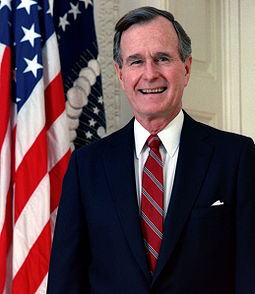 George H. W. Bush U.S. Presidency George H. W. Bush U.S. Presidency
- 14 Feb 1989—14 Feb 1989: The first of 24 satellites of the Global Positioning System is placed into orbit
- 2 Mar 1989—2 Mar 1989: EU decision to ban production of all chlorofluorocarbons (CFCs) by the end of
the century
- 9 Nov 1989—9 Nov 1989: Berlin Wall torn down
- 21 Nov 1989—21 Nov 1989: Proceedings of House of Commons first televised live
|
| 46 | 1990 | - 11 Feb 1990—11 Feb 1990: Nelson Mandela released in South Africa
- 31 Mar 1990—31 Mar 1990: Riots in London against Poll Tax which had been implemented in England &
Wales
- 25 Apr 1990—25 Apr 1990: Hubble space telescope launched
- 2 Aug 1990—28 Feb 1991:
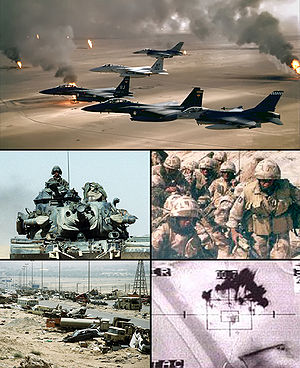 Gulf War Gulf War
- 22 Nov 1990—22 Nov 1990: Margaret Thatcher resigns as Conservative party leader (and Prime Minister)
- 1 Dec 1990—1 Dec 1990: Channel Tunnel excavation teams meet in the middle
|
| 47 | 1991 | - 1991—1991: Poll Tax replaced (by Council Tax)
- 1991—1991: The 'Internet' comes into existence
- 18 May 1991—18 May 1991: Helen Sharman is first British Astronaut in Space
- Aug 1991—Aug 1991: Collapse of the Soviet Union
- 6 Sep 1991—6 Sep 1991: Leningrad renamed St Petersburg
- 5 Nov 1991—5 Nov 1991: Robert Maxwell drowns at sea
|
| 48 | 1992 | - 7 Feb 1992—7 Feb 1992: European Union formed by The Maastricht Treaty
- 22 Apr 1992—22 Apr 1992: Betty Boothroyd elected as first female Speaker of the House of Commons
- 15 Aug 1992—15 Aug 1992: Football Premier League kicks off in England
- 16 Sep 1992—16 Sep 1992: 'Black Wednesday' as Pound leaves the ERM
- 20 Nov 1992—20 Nov 1992: Fire breaks out in Windsor Castle causing over ?50 million worth of damage
- 24 Nov 1992—24 Nov 1992: The Queen describes this year as an 'Annus Horribilis'
|
| 49 | 1993 | - 1993—1993: Betty Boothroyd first woman Speaker of the House of Commons (to 2000)
- 1993—1993: Elizabeth II becomes first British Monarch to pay Income Tax
- 20 Jan 1993—20 Jan 2001:
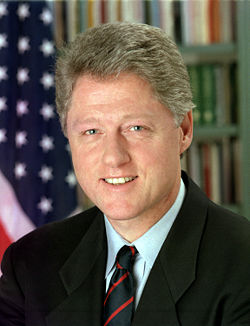 Bill Clinton U.S. Presidency Bill Clinton U.S. Presidency
- Jul 1993—Jul 1993: Ratification of Maastricht Treaty, established the European Union (EU)
|
| 50 | 1994 | - 1994—1994: 15 million people now connected to the Internet
- 12 Mar 1994—12 Mar 1994: Church of England ordains its first female priests
- 6 May 1994—6 May 1994: Channel Tunnel open to traffic
- 19 Nov 1994—19 Nov 1994: National Lottery starts
|
| 51 | 1995 | - 26 Feb 1995—26 Feb 1995: Nick Leeson brings down Barings Bank
- 15 Jul 1995—15 Jul 1995: First item sold on Amazon.com
- 16 Nov 1995—16 Nov 1995: The Queen Mother has a hip replacement operation at 95 years old
- 22 Nov 1995—22 Nov 1995: Toy Story' released - first feature-length film created completely using
computer-generated imagery
|
| 52 | 1996 | - 9 Feb 1996—9 Feb 1996: IRA bomb explodes in London Docklands - ends 17 month ceasefire
- 13 Mar 1996—13 Mar 1996: Dunblane massacre
- 15 Jun 1996—15 Jun 1996: IRA bomb explodes in Manchester
- 5 Jul 1996—5 Jul 1996: Scientists in Scotland clone a sheep (Dolly)
- 28 Aug 1996—28 Aug 1996: Charles, Prince of Wales and Diana, Princess of Wales are divorced
|
| 53 | 1997 | - 30 Mar 1997—30 Mar 1997: Channel 5 TV begins in UK (launched by the Spice Girls)
- 1 May 1997—1 May 1997: 'New' Labour landslide victory in Britain (Tony Blair replaces John Major as
Prime Minister)
- 6 May 1997—6 May 1997: Announcement that Bank of England to be made independent of Government
control
- 11 May 1997—11 May 1997: First time a computer beats a master at chess (IBM's Deep Blue v Garry
Kasparov)
- 1 Jul 1997—1 Jul 1997: Hong Kong returned to China
- 19 Jul 1997—19 Jul 1997: IRA declares a ceasefire
- 31 Aug 1997—31 Aug 1997: Diana, Princess of Wales killed in car crash in Paris
- 25 Sep 1997—25 Sep 1997: Land speed record breaks sound barrier for first time
|
| 54 | 1998 | - 10 Apr 1998—10 Apr 1998: Good Friday peace agreement in Northern Ireland - effectively implemented in
May 2007
- 14 Aug 1998—14 Aug 1998: Car bomb explodes in Omagh killing 29 people
- 27 Sep 1998—27 Sep 1998: 'Google' search engine founded
|
| 55 | 1999 | - 1999—1999: World population reaches 6 billion
- 1 Jan 1999—1 Jan 1999: European Monetary Union begins - UK opts out - by the end of the year the
Euro has approximately the same value as the US Dollar
- 1 Jul 1999—1 Jul 1999: The Scottish Parliament is officially opened by Queen Elizabeth - powers are
officially transferred from the Scottish Office in London to the new devolved Scottish
Executive in Edinburgh
- 11 Aug 1999—11 Aug 1999: Total eclipse of the sun visible in Devon and Cornwall
- 11 Nov 1999—11 Nov 1999: Hereditary Peers no longer have right to sit in House of Lords
|
| 56 | 2000 | - 1 Jan 2000—1 Jan 2000: The year in Britain started with a 'flu bug rather than a millennium bug
- Mar 2000—Mar 2000: London Eye opens, late but popular
- 22 Apr 2000—22 Apr 2000: The Big Number Change takes place in the UK - affected telephone dialling
codes assigned to Cardiff, Coventry, London, Northern Ireland, Portsmouth and Southampton
- 4 May 2000—4 May 2000: Ken Livingstone elected first Mayor of London (not to be confused with Lord
Mayor of London!)
- 10 Jun 2000—10 Jun 2000: Millennium footbridge over the Thames opens, but wobbles and is quickly
declared dangerous and closed - finally reopened Feb 2002
- 25 Jul 2000—25 Jul 2000: A chartered Air France Concorde crashes on take-off at Paris with the loss of all lives
- Sep 2000—Sep 2000: 'People Power' emerged suddenly as protestors against high Road Fuel Tax used
mobile phones and the Internet to co-ordinate blockades on fuel depots - resulted in
nationwide panic buying of fuel and service stations running out across the country
- Oct 2000—Oct 2000: Heavy rains cause worst flooding since records began (1850s) in many
parts of Britain (Oct-Dec)
- 17 Oct 2000—17 Oct 2000: Derailment at speed on the main London-North eastern line at Hatfield caused
by a broken rail
|
| 57 | 2001 | - 20 Jan 2001—20 Jan 2009:
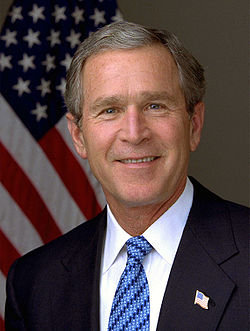 George W. Bush U.S. Presidency George W. Bush U.S. Presidency
- Feb 2001—Feb 2001: Outbreak of Foot & Mouth disease in UK - lasted until October - caused
postponement of local and general elections from May to June
- 12 May 2001—12 May 2001: FA Cup Final played at the Millennium Stadium in Cardiff - first time away from Wembley since 1922
- 7 Jun 2001—7 Jun 2001: General Election - Labour returned again with a large majority, the first time
they had succeeded in gaining a second term
- 1 Sep 2001—1 Sep 2001: New-style number plates on road vehicles in UK [eg. AB 51 ABC]
- 11 Sep 2001:
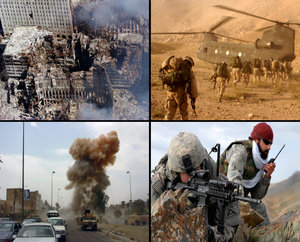 War On Terror War On Terror
- 7 Nov 2001—7 Nov 2001: Concorde flights resume after modifications to tyres and fuel tanks
- Dec 2001—Dec 2001: UK Christmas stamps self-adhesive for the first time (self-adhesive 1st & 2nd class
definitives already on sale)
|
| 58 | 2002 | - 1 Jan 2002—1 Jan 2002: Twelve major countries in Europe (Austria, Belgium, Holland, Irish Republic,
Italy, Luxembourg, Finland, France, Germany, Greece, Spain, Portugal) and their
dependents start using the Euro instead of their old national currencies; the UK stays
out - the Euro worth 62?p at this time
- 22 Feb 2002—22 Feb 2002: Millennium Bridge over the Thames in London finally opens
- 30 Mar 2002—30 Mar 2002: The Queen Mother dies, aged 101 years
- 2 Jul 2002—2 Jul 2002: Steve Fossett becomes the first person to fly solo around the world nonstop in a
balloon
|
| 59 | 2003 | - 17 Feb 2003—17 Feb 2003: Start of Congestion Charge for traffic entering central London
- 10 Aug 2003—10 Aug 2003: Temperatures reach record high of 101 F (38.3 C) in Kent
- 24 Oct 2003—24 Oct 2003: Last commercial flight of Concorde
- 22 Nov 2003—22 Nov 2003: England wins Rugby World Cup in nail-biting final in Australia - first northern
hemisphere team to do this
- 13 Dec 2003—13 Dec 2003: Saddam Hussein captured near his home town of Tikrit (executed 30 Dec 2006)
- 26 Dec 2003—26 Dec 2003: Queen Mary 2 arrives in Southampton from the builder's yard in France 2004
|
| 60 | 2004 | - 29 Mar 2004—29 Mar 2004: Ireland becomes first country in the world to ban smoking in public places
- 29 Mar 2004—29 Mar 2004: Alistair Cooke dies at the age of 95 - until four weeks previously, and since
1946, he had broadcast his regular 'Letter from America' on BBC radio
- 1 May 2004—1 May 2004: Enlargement of the European Union to include 25 members by the entry of 10
new states: Estonia, Latvia, Lithuania, Poland, Czech Republic, Slovakia, Hungary,
Slovenia, Malta, Cyprus
|
| 61 | 2005 | - 16 Feb 2005—16 Feb 2005: Kyoto Protocol on climate change came into force
- 18 Feb 2005—18 Feb 2005: Ban on hunting with dogs came into force in England & Wales (had already
been a similar law for about two years in Scotland)
- 6 Jul 2005—6 Jul 2005: London chosen as venue for the 2012 Olympic Games
- 7 Jul 2005—7 Jul 2005: Suicide bombers attack London for the first time
- 28 Jul 2005—28 Jul 2005: IRA declare an end to their 'armed struggle'
- 12 Sep 2005—12 Sep 2005: England regain the 'Ashes' after a gripping Test series (but are whitewashed 5-0
in the return series in Australia 2007)
- 9 Dec 2005—9 Dec 2005: Last Routemaster bus runs on regular service in London
- 11 Dec 2005—11 Dec 2005: Explosions at the Buncefield Oil Depot in Hemel Hempstead
- 21 Dec 2005—21 Dec 2005: Same-sex civil partnerships begin
- famously, on this day, between Elton John and David Furnish
|
| 62 | 2006 | - 1 Mar 2006—1 Mar 2006: Welsh Assembly Building opened by the Queen
- 26 Mar 2006—26 Mar 2006: Prohibition of smoking in enclosed public places in Scotland
- 21 Apr 2006—21 Apr 2006: 80th birthday of Queen Elizabeth II
- 21 Aug 2006—21 Aug 2006: UK postage rates start to be measured by size as well as by weight
|
| 63 | 2007 | - 1 Jan 2007—1 Jan 2007: Further enlargement of the European Union to include Bulgaria and Romania
- 19 Feb 2007—19 Feb 2007: Extension of Congestion Charge zone for London, westwards
- 8 May 2007—8 May 2007: A Northern Ireland Executive formed under the leadership of Ian Paisley (DUP)
and Martin McGuinness (Sinn Fein)
- 1 Jul 2007—1 Jul 2007: Prohibition of smoking in enclosed public places in England (thus completing
cover of the entire UK)
- 14 Nov 2007—14 Nov 2007: First rail service direct from St Pancras to France (replacing that from Waterloo)
|
| 64 | 2009 | |



 Submit Photo / Document
Submit Photo / Document
